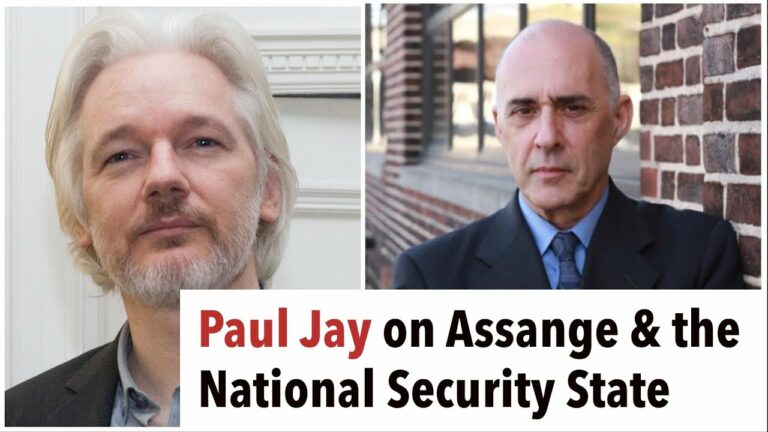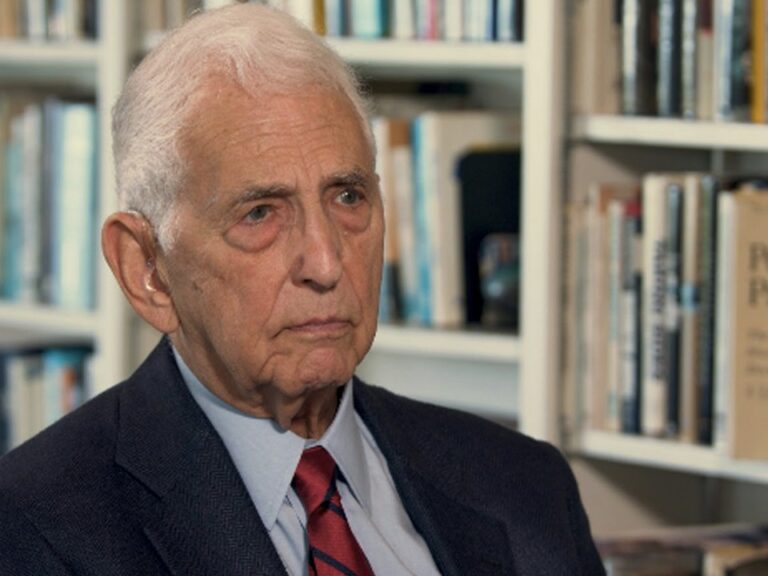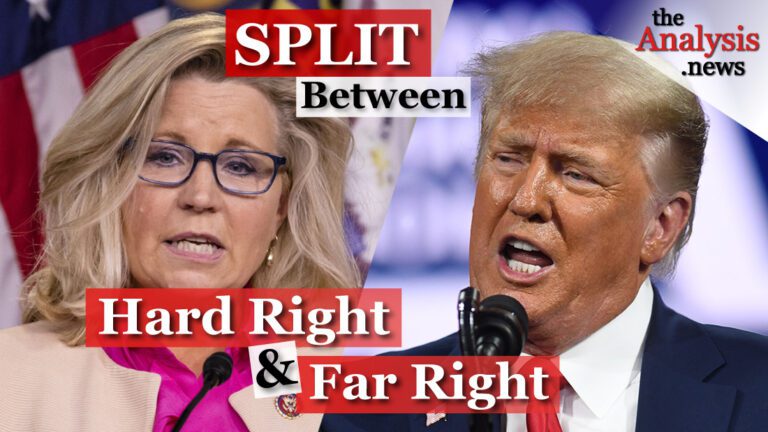Trump inspires the most reactionary, racist, Islamophobic, xenophobic sectors of U.S. Population; Biden represents pragmatic imperialism and a more socially liberal approach on domestic issues, says Phyllis Bennis on theAnalysis.news podcast with Paul Jay
Transcript
Paul Jay
Welcome to theAnalysis podcast, I’m Paul Jay. There is a debate going on in progressive circles and otherwise about whether the Biden presidency, a possible Biden presidency, will be any better than a Trump presidency. Or not significantly enough better, that people that supported Bernie Sanders and others on the left, should in any way advocate for voting for Joe Biden. They say, well, Trump’s language, some people say, has been bellicose and aggressive. He actually hasn’t started any major foreign wars.
And Biden supported the Iraq war. And so they say there’s not any real evidence to do what Chomsky advocates and others, including Daniel Ellsberg and some other people, too. Yes, vote for the lesser evil.
At any rate, to talk about, particularly this issue and foreign policy, is Phyllis Bennis. She joins us. She’s the director of the New Internationalism Project at the Institute for Policy Studies. She’s written and edited about 11 books. And over the years, I’ve interviewed Phyllis and butchered the title of almost every one of her books. Among her latest, and I‘m reading it now, so I won’t butcher it. “Understanding ISIS and the New Global War on Terror, a Primer,“ as well as the just published seventh updated edition of her popular, “Understanding the Palestinian Israeli Conflict.“ Thanks for joining us, Phyllis.
Phyllis Bennis
Great to be with you, Paul.
Paul Jay
I’m surprised that some of the people on the left, you know, some fairly well-known people who are advocating don’t even get involved in this presidential election. Focus on movement building and such. And it doesn’t really matter whether Biden or Trump wins.
What’s your take?
Phyllis Bennis
Well, I think if we’re talking about their policies in general, it’s hard for me to imagine anyone saying that. If we’re talking about foreign policy, there’s a slight difference, although not as much as some people might think. But the notion that, for example, it would be enough for me to look at the question of who’s going to be on the Supreme Court, who’s going to be in the other federal courts, period, full stop. Because that’s where you look at what’s going to prevent us from protesting, what’s going to prevent us from building movements? Courts could if we had all the reactionary judges that would be similar to the ones that are now being, even today are being approved in the Senate. This would be an incredibly dangerous, another four years of this. This would set in in stone for 40 years or more, a generation or two generations of right wing judges. That alone should give pause to anyone who wants to talk about movement building as if you can separate that from questions of power.
Of course, we have to focus on movement building. And of course, it’s true that in this country where democracy is so flawed by issues of class and race and so many other issues, it’s never our turf and it’s never our people, fully. It’s all about lesser evils. But the notion that somehow if it’s only a lesser evil, it doesn’t matter is simply a question, in my view, of privilege of those who do not live at the bottom of the hierarchy of economic reality in this country. If you are among the poorest in this country, that last half inch matters a great deal. You know, someone once said, I’d like to think it was Pete Seeger, but I’m not actually sure that was true. But somebody said if you’re drowning, and the water is up over your mouth, the last half inch between your mouth and your nose is life and death. It’s only half an inch, but it’s life and death. And the difference between bad and worse is far more significant than the mythical danger between good and bad in this case. So I think it should not even be a question. Now, I can’t endorse or propose candidates. I work for a nonprofit. We don’t endorse candidates. But looking analytically at the actions of the two, I don’t think there’s any question there. On the issue of foreign policy; obviously, these are two terrible foreign policies. Biden not only supported the Iraq war in terms of voting for it, but he orchestrated its support on the Senate Foreign Relations Committee when he was the chair of the committee. I have no love for him. He prevented me from testifying at the committee at one point, I guess about 20 years ago. No, not that much. About fifteen years ago. But what’s more important is where will there be room to press? Who are they accountable to? The Trump administration, the Trump family, Trump himself has made clear that their accountability is solely to the billionaire class. The Davos class, if you will. They don’t even pretend to be accountable to the political base that Trump, in fact, counts on to vote for him. They’re clearly not accountable to those people. Those are the people who are going to be the most hurt by some of these economic policies that are now in place. The real accountability is to the rich, the super rich and the billionaires. When and if Biden gets elected, it will be because there will be support for him from a wide range of people, including probably, some Republicans and a number of Democrats who do not support him, did not support him during the primaries, don’t support him now, but see him as crucial for beating Trump. And in that context, there will have to be, in a Biden administration, more accountability to political pressure coming from, whether it’s Bernie supporters, whether it’s supporters of any of the other candidates, the other centrist candidates, Elizabeth Warren, all of those forces are going to have to be involved in protest movements later, inevitably. And when they are the Biden administration, if such a thing exists, we’ll have to take them far more seriously than a Trump administration. If it came to power, we would have to take them seriously because they wouldn’t have any, they wouldn’t have played any role in bringing Trump to power. So I think it’s a really dangerous, privilege based, if you will, view to say that voting doesn’t matter. I don’t think it was that different in the era when people were willing, and some did sacrifice their lives to protect the right to vote, to win the vote and protect it. It‘s not quite the same now, but the consequences are still the same. And I think that that has to be kept in mind when we think about these kinds of questions.
Paul Jay
As you say, the Supreme Court, like that alone, is an issue for you, and I agree with that. But when it comes to foreign policy, to me, Iran, alone, is a litmus test or a break point issue. The difference between the nuclear agreement that Obama negotiated and Biden organized and fought for in the Senate. Larry Wilkerson was saying that he was active in trying to get that passed, and they worked with Biden, who helped rally the votes in Congress for it, and as opposed to this economic war on Iran. And we may yet see a more overt military action against Iran.
Phyllis Bennis
Well, I think we already have. And we’re seeing, you know, sending two U.S. aircraft carrier groups just, what, three weeks ago to the Persian Gulf deliberately to taunt and and pressure Iran. What we’ve seen these exchanges in the Persian Gulf between U.S. and Iranian ships. You know, I think the notion that we’re not already seeing a a level of of low level military engagement with Iran is already underway. And I think it is important to recognize that one of the, you know, the one of the few things that a Biden campaign will be able to point to is his longstanding connection with Obama. That’s one of his great credentials, as he would see it, in the Democratic Party, Obama being so popular among sectors of , the Democratic Party. And one of Biden’s credentials is, “I was his vice president. He chose me. He trusted me.” One aspect of that means he’s going to have to defend a lot of initiatives that Obama took, whether he agrees with them or not, because that’s going to be part of his political credibility. Unlike it’s sort of the mirror opposite of what Trump has, which is he wants to come out against everything Obama stood for because part of his appeal to his base is he’s the anti-Obama. So all of the racism that was directed at Obama, Trump credentials that, he enable that, he cheers it on. Anything that Obama was responsible for, he is opposed, whether it’s health care, whether it’s the Iran nuclear deal. So in that context, I think that it’s very definitely one of the big areas where there will be a vast distinction between an Obama presidency, sorry, a Biden presidency and a Trump presidency.
Paul Jay
Trump has gotten some credit for the deal with the Taliban in Afghanistan. It’s also pointed to an example that Biden might not have made such a deal. And this shows that Trump was actually not as bellicose as his rhetoric. But, as you know, I made a film in Afghanistan. I’m in touch with people there. And this deal is not very popular amongst progressives in Afghanistan who who see the Taliban as a fascist force. And, yes, they want the United States out, but they don’t want institutionalizing the Taliban again.
Phyllis Bennis
A young friend of mine, Malalai Joya, who was the youngest member of the parliament in Afghanistan and one of the very few women who was in the parliament right after the the U.S. installed a parliament after overthrowing the Taliban government, she and I were together at an anti NATO protest in Germany about, oh, I guess about 10 years ago. And at one point during that protest, she and I were chatting, and I I asked her, I said, you know, we’re hearing from some women in Afghanistan that they’re very uneasy about the possibility of a U.S. troop withdrawal and negotiations with the Taliban. What do you think? And she said, you know, we in Afghanistan, we women, we in civil society, we have three big enemies that we are fighting against, that we have to oppose. One is the Taliban. Two is the government of warlords that was installed by the U.S. That is not very different than the Taliban and is as almost as militarized as they are. Third is the U.S. occupation forces. And she looked at me and she said, “If you could get rid of one of them, we’d only have two” And I thought that was a very sensible approach. There’s no illusion. There’s no illusion. Number one, that pulling out U.S. troops is going to end the conflict or end the war. There certainly will continue to be fighting. There will continue to be casualties, but we will not see the attacks by air on wedding parties. We will not see the number of airstrikes last year in twenty nineteen was the highest number in over a decade in Afghanistan. So the escalation of war in Afghanistan is going up. It’s not going down. And I think that what it means is not that pulling out U.S. troops is going to lead to peace right away. It just means that for a while there may be fewer casualties, fewer people will die. Not so many Afghans will be killed. And I think that’s an important thing that we should support. We can’t have any illusions, but we need to support the understanding that the U.S. troops and the U.S. bombers in Afghanistan are not protecting the Afghans. They don’t even claim to be. They claim to be there to make sure that Afghanistan is never again used for an attack on the United States. To me, that is not a legitimate reason for a military occupation and for continual bombing of another country.
Paul Jay
I mean, I agree with that. I would just add to that that the not having illusions about why Trump did this is important part of the analysis of a Trump foreign policy. The Taliban, to a large extent, was the creation of the Pakistani ISI, the and the Saudis, and continues to be. The most reactionary forces in the Pakistani armed forces to a large extent, are al-Qaeda. So we’re talking about a very dark fascist force now. Yeah, it’s better for the Afghans that the Americans get out because, as you say, there’ll be less wedding parties bombed and that’s meaningful. But I think it’s the show some kind of non-interventionist stance of Trump. I think that’s a big mistake because, as I say, he’s essentially just working with his fascist allies in Saudi Arabia and Pakistan.
Phyllis Bennis
But I do think that there’s something else that’s going on here that’s important, and that is what’s the difference between the government that’s in power that would be the opposition to the Taliban and the Taliban themselves. There’s a sense that, well, those those are the Western guys. They are not the human rights violators. They’re not the ones that throw acid in the face of women who have the temerity to think they have the right to go to school. In fact, the guy who was the first one to ever use that horrific tactic of throwing acid in the face of a young woman student was somebody who was being supported by the United States, who came to the U.S. to meet Ronald Reagan in the 1980s when he was part of the anti Soviet Mujahideen. Ghobadi an Hekmatyar is his name, and he remains a very active player in and around the Afghan government. So the concerns of Afghan women and others is absolutely right. But the concern is almost as bad of the warlords who make up this U.S. backed government as it is about the Taliban. So, you know, I think the question is not do we want the Taliban? Number one, it’s not up to us. We should recognize that in the civil war that lasted almost six years, when the Taliban won the war in 1996, when they took power, they beat the other factions. What was known then as the Northern Alliance and is known now as the government of tactic of Afghanistan.
But in that context, the Taliban also had won the hearts and minds of a significant component of the Afghan people, not because they were not as bad as we heard, they were as bad as we heard. But because they promised to end the bombing. They promised to end the fighting. And to a large degree, they did. And that’s one of the most important things. The people who are most opposed to it, and it’s a lot of women who are opposed to the Taliban for all the right reasons, all the understandable reasons, are mainly in the cities. They’re mainly in Kabul and Kandahar. The vast majority of Afghan women, Afghan people, do not live in the cities. They live in tiny villages scattered across this vast land, very divided from each other, very little communication, no good roads, certainly not with access to cell phones and that sort of thing. And the result is that what people are looking for is an end to the violence. There’s less concern, I think, about which faction ends up in power. There will be a price to be paid by women in Afghanistan, particularly those who have worked historically and have gained positioning in the parliament, in business, in education. That’s absolutely right. They will pay a price and they are a tiny minority of the population of the country.
Paul Jay
Yeah, my point was not that there’s anything better about the Northern Alliance. When I made the film, “Return to Kandahar,” we interviewed Dostum, who became very, I don’t know, frankly, I’m not sure if he’s still senior in government or not, but he became very senior. And this guy was a mass murderer. There’s no doubt. No, my point wasn’t that. My point is that this isn’t a reflection of some non-interventionist instinct of Trump to get out of Afghanistan because his allies are going to control Afghanistan.
Phyllis Bennis
Right. But it is part– I don’t think that he’s doing this in the interest of Saudi Arabia and/or Pakistan. I think his interest is in what he would perceive as being able to tell his base that he’s winding down direct military participation, not out of any commitment to non-interventionism, but because it’s from his base that the soldiers come. Soldiers in this country are more isolated from the elites of the mass media, from the government, from the coastal cities than anyone else. They overwhelmingly come, disproportionately come, from small towns and rural areas. You know, we used to have during the Vietnam era, we had, as you will remember, Paul, from your years in Canada, seeing it and seeing those who escaped to Canada when there was a legal draft. There was a disproportionate number of poor black kids from the ghettos and poor Latino kids from the barrio, those who who were the ground troops in Vietnam. In the global war on terror in this era we don’t see that. The racial divide within the military is more or less proportionate to what it is in society. Where there’s a disproportionality it’s in urban, rural, overwhelmingly. So it’s from rural areas and tiny towns where you see more people being recruited because there is still a draft in place. There’s a draft of non-opportunity. There’s a draft in poverty. There’s a draft of I need health care and I can’t get it any other way. It’s a terrible impact. But one of the results is that people who are writing about the wars, people who are describing the wars most often on the national scene, they don’t know anybody in the military. They’ve never known anybody who went into the military because they grew up in a city. They went to a big university. They went to graduate school in journalism. They simply don’t have any experience with that community, the military community. And that’s who Trump sees as part of his base. So he is trying to pull out troops to satisfy his electoral base. This is all about getting re-elected.
Paul Jay
Well, I would say it’s more than that. First of all, my point is that–
Phyllis Bennis
I don’t think Afghanistan is.
Paul Jay
Well, let me make my point. Number one, I certainly agree with you. This is about his base. I don’t disagree with any of that. But it doesn’t show an approach to foreign policy that’s noninterventionist. Yes. He wants to please his base. Yes. It makes him look noninterventionist and gets him some kudo’s. But it’s specific because he can do it because his allies, his fascist allies in Saudi Arabia and Pakistan are going to wind up in control. He’s not pulling out and losing Afghanistan as an issue within the American sphere of influence. In fact, it might even be more so after this.
Phyllis Bennis
On the question of Iran, I think there is a long standing piece of military culture, which is a very macho culture inside where there is this claim that, you know, the big guys wanted to go to Baghdad. Real men want to go to Tehran. That’s been an ongoing sort of macho assertion for years. And I don’t think it’s any different now. If there is a military escalation against Iran, which is certainly a possible danger, and it becomes more possible when the U.S.does things like the assassination of Sulimani in Iraq, as it did in January of this year, where if it was a really very dicey moment, whether there could have been a direct U.S. Iranian battle at that point, which could well have gone regional or even global in a certain set of ways. But I think that what we were seeing there was the possibility of a very different kind of war. I don’t think we are looking at any possibility of an Iraq style war in Iran, which starting with shock and awe and then massive ground troops. That is simply not going to happen. That’s not the the kind of war that the military has ever looked at in Iran as the option. So the notion that ground troops or special forces would be involved, sure, and there are special forces in Iran, sorry, in Afghanistan. There are special forces in Afghanistan. But I don’t think that this is a anything close to a quid pro quo. And I don’t think that, you know, the rumours that go through the military, just like they go through non-military communities, are the basis for for assessing what the most likely nature would be of any kind of military action against Iran.
Paul Jay
I agree with that. But if there is a military action, it might be in Iraq.
Phyllis Bennis
Absolutely.
Paul Jay
It’s consolidating the U.S. position in Iraq as they try to take advantage of the Covid crisis in Iran.
Phyllis Bennis
I don’t think that a massive ground invasion of any country in the Middle East is is likely in the next period. I don’t see that happening.
Paul Jay
Yeah, I’d agree with that. We often talk about Trump, and we talk about Biden. We talk about this individual’s record and that individual’s record. But I think we do too much of that. I mean, we generally analyze these things, including mainstream. To me, it’s more about different sections of capital, different sections of the oligarchy. And, well, it’s not like the Trump individual doesn’t play a role. And same with Biden. That Trump and all the people around Trump, which have a real root in the most aggressive neo cons, Cheneyesque kind of people. And the people that he’s appointed to national security positions and so on, have all been very aggressive neo con types. And what Biden represents, which is more–. It’s not like they’re not aggressive. They can be very aggressive, but they’re less aggressive. And the Iran deal is an example of that. They’re more pragmatic about making sure that American dominates capital flows and markets, not as eager to get into a big, full scale war. And those two different sections of capital and their political representatives. I think that’s what we need to be looking at. And I think the records clear that section that Obama represented. And no doubt, therefore, for U.S. empire. And he had the Asian pivot. And he’s got, you know, the containment of China. We talked about Trump’s now budgeting for it. But don’t you think we need to talk a little bit more about this past, the personalities of these two people?
Phyllis Bennis
Yes, but—-. I think we have to get past the personalities. But I disagree with you somewhat on the question of where Trump fits into that. I think it’s a mistake to see this in the classic way that we’ve always talked about sections of U.S. capital and the divide within the US ruling class and who represents, you know, which part of neoliberalism of the neoconservatives. I don’t believe that Trump is accountable to the U.S. ruling class, period, full stop. I think he’s very much a different animal in this case. I think that he has a very personalized view. It’s about the wealth of he and his family, not about the wealth of the U.S. billionaires, some of whom support him, many of whom oppose him. And I think that the personality, in this case, is far more important. I think that Trump, the person, plays a much bigger role than Biden the person would ever play. And it’s not so much in policy setting alone, although the question of, you know, his willingness to appoint judges who the ABA have unanimously said are not qualified. A judge who has never tried a case and appoints them to the most powerful appellate court in the world, wealth in the world also. But the most powerful appellate court in this country and doesn’t care that even Republicans, even other right wingers are saying, you know, this is really not very appropriate. This guy doesn’t have any credentials at all. He doesn’t care because I believe he is not accountable to the U.S. ruling class. I think he has a very personalized set of goals. It’s about he and his family maintain their wealth, expanding their wealth, expanding his personal influence. And it’s a very different kettle of fish if you will than a situation where we have representatives of two different wings of the U.S. ruling class. I think Biden in a very traditional way, does represent more pragmatic imperialism, the same as Obama and a socially liberal approach on domestic issues, which is important for, you know, hundreds of millions of people in this country, whether women have the right to choose health care, whether children have the right to sufficient food, whether everybody has the right to health care. All of those. It makes a big difference whether you have a social liberal in the White House or someone who has no accountability to the public at all. And I think that’s what we’re dealing with here. That’s part of the reason I feel so strongly about the need to, certainly for people to vote, but to see it in the context of what the stakes really are, that this is not merely, if you will, even though I believe that’s important, too. This is not merely a divide between factions of the ruling class. This is someone who has the personal ability to inspire, to enable to protect and defend the most reactionary, racist, Islamophobic, xenophobic sectors of the U.S. population. Seeing these armed protesters in Michigan and elsewhere as essentially his shock troops that are going to defend his position. I think that’s what we’re up against here. And I think the stakes are far higher than they would be in an otherwise ordinary election where you have a debate and a decision between two sectors of the ruling class, neither of whom you support, but who are not really all that different. I think there’s a huge difference here.
Paul Jay
Our thanks for joining us, Phyllis.
Phyllis Bennis
Thank you, Paul. It’s been a pleasure.
Paul Jay
And thank you for joining us on the Analysis.news podcast.





Quality-focused
Function-based
Concrete
Trump is a unique danger? This Vote Democrat BS gets tiresome. You are starting a new website to tell people to vote Democrat? We should support Biden because he represents “pragmatic imperialism”? Yea, I am all for US imperialism so long as it is pragmatic. How you think you are being any less dogmatic, thoughtless, and narrow-minded than a Trumpster is beyond me.
When I see Biden come on to the stage I almost see the Zimmer frame he is holding on to. Do you really think he might win the election? I always thought he was there to actually loose the election after getting Bernie – who might have won – out of the race. The US appears to fall apart more and more without that this can be stopped – so the Democrats will rather watch this happen unter Trump. Afterwards they will step up as the saviours from that – if any “saving” ist possible at all. (Caveat: I’m watching all this from afar).
For some unknown reason Biden’s obvious cognitive decline is not being covered in these discussions. I can not see him going the distance with Trump.
What does PB think is the real reason for US bombing in Afghanistan as well as other regions? ? To save women from acid? Of course not. The answer is because there are millions of dollars involved in these operations. Each drone strike brings money raining down on the contractors who manufacture the killer weapons. The meaning of “winning” is profits. Any other erudite, knowledgeable or ideological thinking sounds hollow and can be deconstructed. But profit always resurfaces, as does political corruption in obtaining contracts from congress. And why is there simply no mention, in this long high sounding exchange, of the craven attitude and behind the scene maneuvers of the DNC against a candidate who, like it or not, showed the way to beat Trump. Bernie was cut off at Super Tuesday, and perhaps also at South Carolina. There was clear voter suppression and it was not a coincidence that two “moderate” candidates dropped out and supported the Zombie, Joe Biden. That was NOT a coincidence. If disgusted Bernie supporters cannot forget this and cannot move beyond the high minded reasons of what might happen at the Supreme Court, I suggest PB is wasting her time. And Paul Jay too.
What does PB think is the real reason for US bombing, whether wedding parties or any other motive? Save women from acid? Of course not. The answer is because there are millions of dollars involved in these operations. The meaning of “winning” is profits. Any other ideological, erudite, knowledgeable thinking sounds hollow and can be deconstructed. But profit always wins.